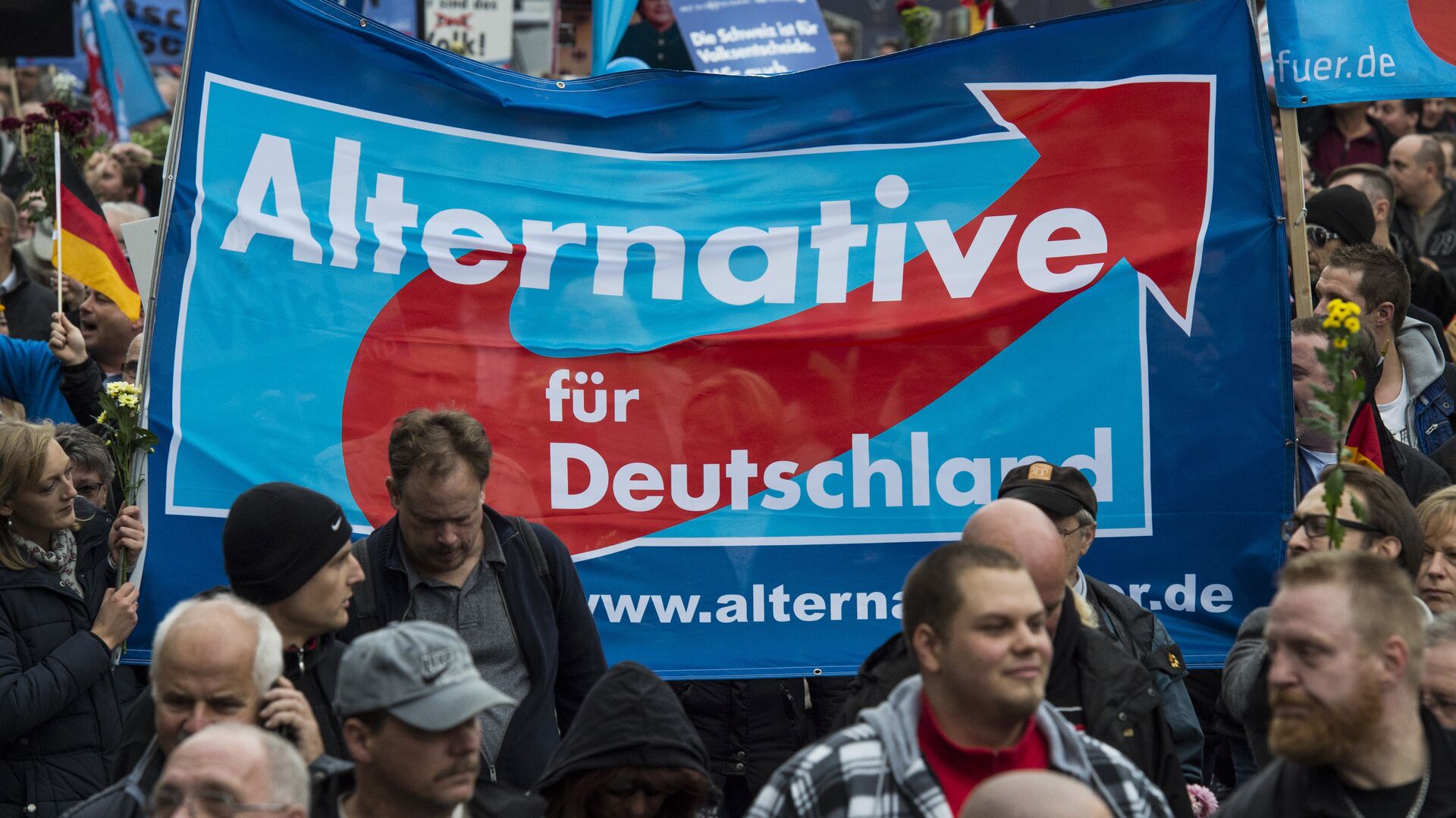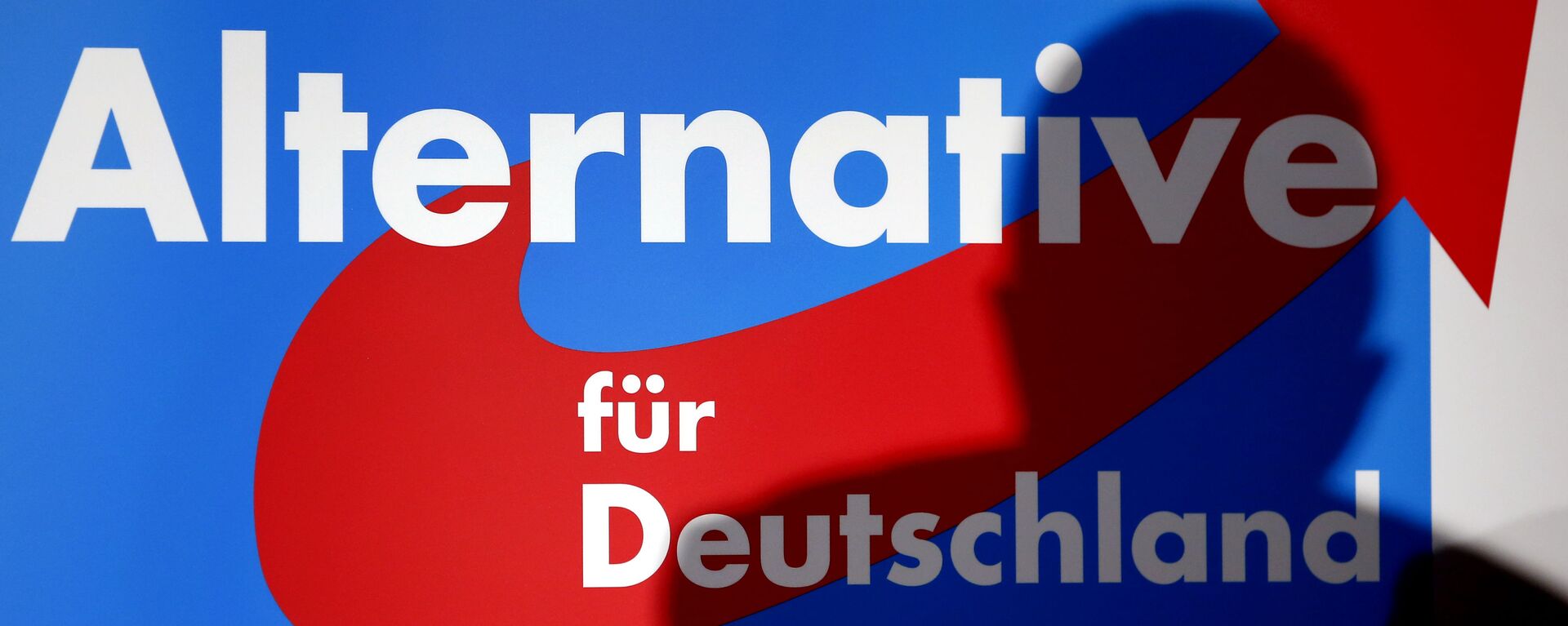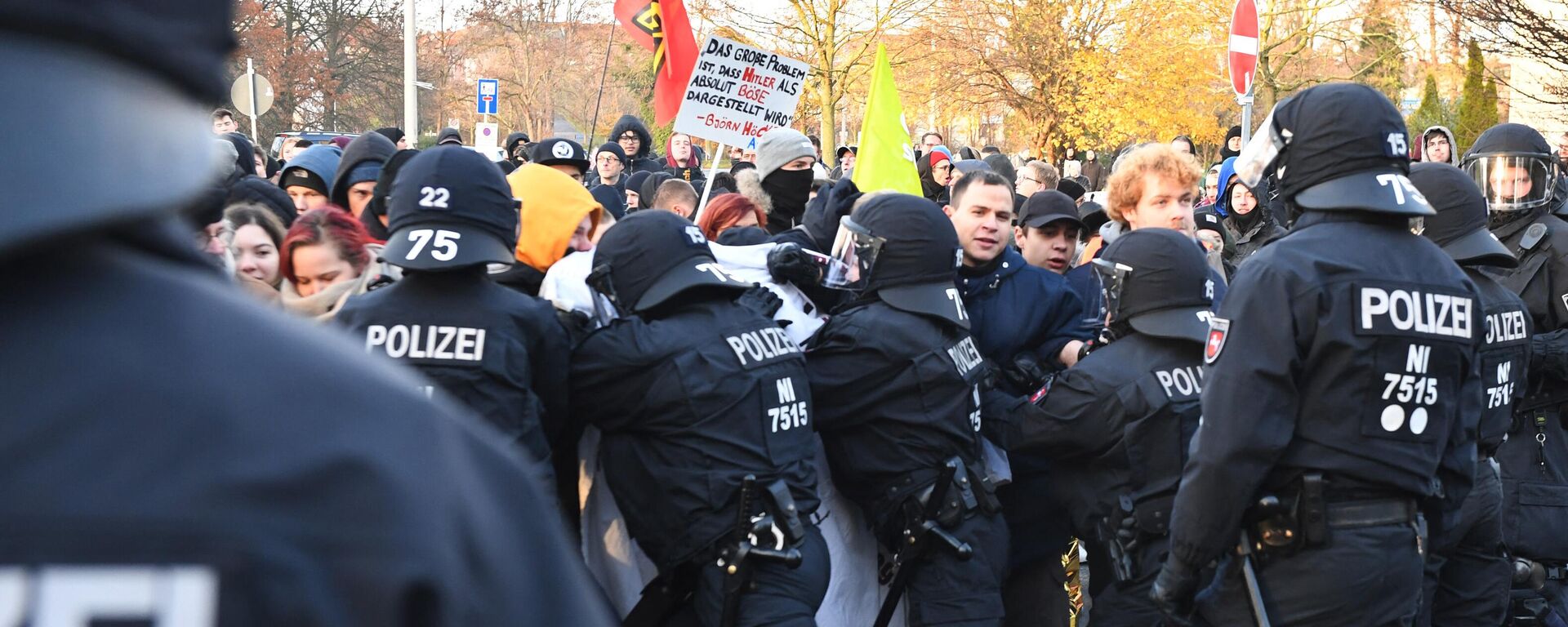https://sputnikglobe.com/20240426/afd-popularity-continues-to-ride-in-second-place-as-crack-downs-on-accused-espionage-cases-begin-1118118801.html
AfD Popularity Continues to Ride in Second Place as Crack Downs on Accused Espionage Cases Begin
AfD Popularity Continues to Ride in Second Place as Crack Downs on Accused Espionage Cases Begin
Sputnik International
A poll released just two weeks ago showed the Christian Democrats (CDU/CSU) as the most favorable party with 31% of prospective voters indicating that they would vote for them. However, the Alternative for Germany (AfD) came in second place with 18% according to the Statista poll.
2024-04-26T04:33+0000
2024-04-26T04:33+0000
2024-04-26T04:33+0000
analysis
germany
alternative for germany (afd)
ukraine
christian democratic union/christian social union (cdu/csu)
ukraine crisis
ukrainian conflict
alternative fuer deutschland (afd)
https://cdn1.img.sputnikglobe.com/img/103098/79/1030987995_0:121:4388:2589_1920x0_80_0_0_ec07adde345451d169d17013752f5194.jpg
Germany’s right-wing political party the Alternative for Germany (AfD) first gained popularity in opinion polls last spring. It entered the federal parliament in 2017 as the first time that a right-wing party has been elected since the 1950s. Anger swelled as millions protested the party when, in mid-January, politicians from the party reportedly met the head of the rightwing extremist Identitarian Movement and neo-Naxi activists to discuss a “masterplan” for mass deportations in Germany.On Thursday, Sputnik’s Fault Lines spoke with George Szamuely, a senior research fellow at the Global Policy Institute and author. Szamuely explained that despite Germany’s history with Nazism, there is a growing favorability for the AfD party as a way to confront frustrations surrounding immigration, a suffering economy, and the government’s support of a proxy war in Ukraine.“Germany is supposed to be the industrial powerhouse of Europe. It's an export-driven economy. And, if Germany is having to pay two, three, four times as much for energy as it has in the past, then basically German manufactured products cease to be competitive, and then Germany ceases to be the economic dynamo that it's supposed to be,” said Szamuely.“So, I think Germans are getting very anxious about their future,” he added. “The Germans are increasingly realizing that, well, this war is doing very nicely for the US, it's not doing anything for the Germans.”Szamuely suggested that while the AfD party is primarily concerned with immigration, they also “want peace” including an immediate peace in Ukraine. The party, he adds, has also expressed “considerable skepticism about NATO” and “German participation in NATO”, and more importantly the party wants to address how to make Germany’s manufacturing industry “the powerhouse of the world again”.“The migrant crisis, it's always been kind of bubbling under the surface in Germany for many years,” he explained. “After the war, they started bringing in Turkish migrant laborers and then the Turks kind of settled down into Germany. So, there was a certain amount of resentment towards that.”Sputnik’s Melik Abdul agreed with his guest’s comment, adding that defense contractors in the US as well as the military industrial complex as whole are “benefitting” from the Ukraine war. The US recently approved about $60 billion in funding for Ukraine, as Kiev looks to replenish its artillery shells and anti-aircraft missiles.“The Alternative für Deutschland is a kind of a populist, right-wing party. It emerged in opposition to the Christian Democrats who were in power for years and years under Angela Merkel. And, well, initially it wasn't doing particularly well,” Szamuely explained.“It really took off after Merkel made that catastrophic decision in 2015 to welcome migrants from the Middle East. And that, from that moment, the Alternative für Deutschland went from strength to strength. I should say, however, that they are now absolutely in the crosshairs of the German intelligence services, the media and German prosecutors.”Early on Tuesday, German prosecutors announced that they had arrested Jian Guo, a German national who worked for AfD MEP Maximilian Krah, on suspicion of spying for China. He was later suspended by the European Parliament after prosecutors claimed he had passed on information about “negotiations and decisions” made in the parliament to China in January, according to one report.German media found that AfD MEP Maximilian Krah, who is the AfD party’s top candidate for European elections in June, had employed Guo.“[The AfD] has nothing in common with the Hitlerite parties and the Nazi Party, because if it did, it would have been banned. I mean, that's still a possibility,” he added. “They could still ban the party, claiming that it's extremist. And, again, the German intelligence services are said to be surveilling the AfD with a view to maybe banning it if they decide that it's a danger to democracy, a danger to political stability in Germany. So, that's still a possibility.”“But, right now, in order to head off a good result in the European parliamentary elections, they're going with this familiar Russiagate, Chinagate allegations and, you know, trying to smear them that way.”
https://sputnikglobe.com/20240124/german-establishment-plan-to-ban-afd-is-orwellian-1116344474.html
https://sputnikglobe.com/20240127/some-100000-germans-protest-right-wing-extremism-in-duesseldorf-1116441181.html
germany
ukraine
Sputnik International
feedback@sputniknews.com
+74956456601
MIA „Rosiya Segodnya“
2024
Mary Manley
https://cdn1.img.sputnikglobe.com/img/07e6/01/0b/1092187887_0:0:2048:2049_100x100_80_0_0_0c2cc4c84f89aff034cc55bb01fb6697.jpg
Mary Manley
https://cdn1.img.sputnikglobe.com/img/07e6/01/0b/1092187887_0:0:2048:2049_100x100_80_0_0_0c2cc4c84f89aff034cc55bb01fb6697.jpg
News
en_EN
Sputnik International
feedback@sputniknews.com
+74956456601
MIA „Rosiya Segodnya“
Sputnik International
feedback@sputniknews.com
+74956456601
MIA „Rosiya Segodnya“
Mary Manley
https://cdn1.img.sputnikglobe.com/img/07e6/01/0b/1092187887_0:0:2048:2049_100x100_80_0_0_0c2cc4c84f89aff034cc55bb01fb6697.jpg
germany regional elections, alternative for germany, afd germany elections, traffic light coalition, federal level, regional level, german elections, german parties, political persecution, political censorship, ukrainian crisis, ukraine crisis, russia-ukraine war
germany regional elections, alternative for germany, afd germany elections, traffic light coalition, federal level, regional level, german elections, german parties, political persecution, political censorship, ukrainian crisis, ukraine crisis, russia-ukraine war
AfD Popularity Continues to Ride in Second Place as Crack Downs on Accused Espionage Cases Begin
A poll released just two weeks ago showed the Christian Democrats (CDU/CSU) as the most favorable party with 31% of prospective voters indicating that they would vote for them. However, the Alternative for Germany (AfD) came in second place with 18% according to the Statista poll.
Germany’s right-wing political party the Alternative for Germany (AfD) first gained popularity in opinion polls last spring. It entered the federal parliament in 2017 as the first time that a right-wing party has been elected since the
1950s. Anger swelled as millions protested the party when, in mid-
January, politicians from the party reportedly met the head of the rightwing extremist Identitarian Movement and neo-Naxi activists to discuss a “masterplan” for mass deportations in Germany.
On Thursday, Sputnik’s Fault Lines spoke with George Szamuely, a senior research fellow at the Global Policy Institute and author. Szamuely explained that despite Germany’s history with Nazism, there is a growing favorability for the AfD party as a way to confront frustrations surrounding immigration, a suffering economy, and the government’s support of a proxy war in Ukraine. “Germany is supposed to be the industrial powerhouse of Europe. It's an export-driven economy. And, if Germany is having to pay two, three, four times as much for energy as it has in the past, then basically German manufactured products cease to be competitive, and then Germany ceases to be the economic dynamo that it's supposed to be,” said Szamuely.
“I think the shift can be explained by Europe essentially losing its independence on sovereignty, of becoming an appendage of the US, and waging a war in Ukraine against Russia,” the researcher added. “So European economies are in very poor shape. European industries are in poor shape. Energy prices are through the roof. And much of it can be blamed on this war that Europe has been pushed into.”
“So, I think Germans are getting very anxious about their future,” he added. “The Germans are increasingly realizing that, well, this war is doing very nicely for the US, it's not doing anything for the Germans.”
Szamuely suggested that while the AfD party is primarily concerned with immigration, they also “want peace” including an immediate peace in Ukraine. The party, he adds, has also expressed “considerable skepticism about NATO” and “German participation in NATO”, and more importantly the party wants to address how to make Germany’s manufacturing industry “the powerhouse of the world again”.
“The migrant crisis, it's always been kind of bubbling under the surface in Germany for many years,” he explained. “After the war, they started bringing in Turkish migrant laborers and then the Turks kind of settled down into Germany. So, there was a certain amount of resentment towards that.”
“And, somehow there is a birth dearth in Europe. There's a shortage of labor in Europe. And the only way of resolving this problem is by importing migrants. I think it's a completely ridiculous argument, but nonetheless, it's an argument that is very fashionable and very dominant in Europe,” he added. “Now, you're right to say that there has been a reaction against that because - the reaction has expressed itself in the rise of the populist right.”
Sputnik’s Melik Abdul agreed with his guest’s comment, adding that defense contractors in the US as well as the military industrial complex as whole are “benefitting” from the Ukraine war. The US recently approved about $60 billion in funding for Ukraine, as Kiev looks to replenish its artillery shells and anti-aircraft missiles. “The Alternative für Deutschland is a kind of a populist, right-wing party. It emerged in opposition to the Christian Democrats who were in power for years and years under Angela Merkel. And, well, initially it wasn't doing particularly well,” Szamuely explained.
“It really took off after Merkel made that catastrophic decision in 2015 to welcome migrants from the Middle East. And that, from that moment, the Alternative für Deutschland went from strength to strength. I should say, however, that they are now absolutely in the crosshairs of the German intelligence services, the media and German prosecutors.”
Early on Tuesday, German prosecutors announced that they had arrested Jian Guo, a German national who worked for AfD MEP Maximilian Krah, on suspicion of spying for China. He was later suspended by the European Parliament after prosecutors claimed he had passed on information about “negotiations and decisions” made in the parliament to China in January, according to one report. German media found that AfD MEP Maximilian Krah, who is the AfD party’s top candidate for European elections in June, had employed Guo.
“For instance, they're now arresting figures within the AfD for supposedly spying for China, receiving money from China, or receiving money from Russia. So, what's now going on in Europe is they're trying to smear the AfD,” the author explained. “That didn't really work. Now, they're doing similar to what's being done in the US, they're using lawfare and making all kinds of allegations.”
“[The AfD] has nothing in common with the Hitlerite parties and the Nazi Party, because if it did, it would have been banned. I mean, that's still a possibility,” he added. “They could still ban the party, claiming that it's extremist. And, again, the German intelligence services are said to be surveilling the AfD with a view to maybe banning it if they decide that it's a danger to democracy, a danger to political stability in Germany. So, that's still a possibility.”
“But, right now, in order to head off a good result in the European parliamentary elections, they're going with this familiar Russiagate, Chinagate allegations and, you know, trying to smear them that way.”
“I think the German intelligence services aligned with the German prosecutors and the German media are going to do a number on the AfD,” he added. “I don't think the AfD is going to do well in the June election. I think they'll do quite well. I don't think they will do anything like as well as they might have done had not the German security services stepped in. And, even if it'll, let's say the National Rally does a little better in France, I think they will be co-opted by the system.”








